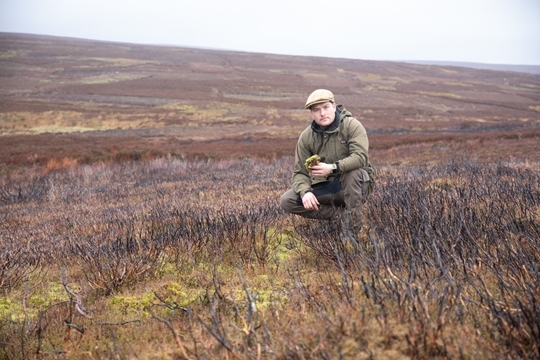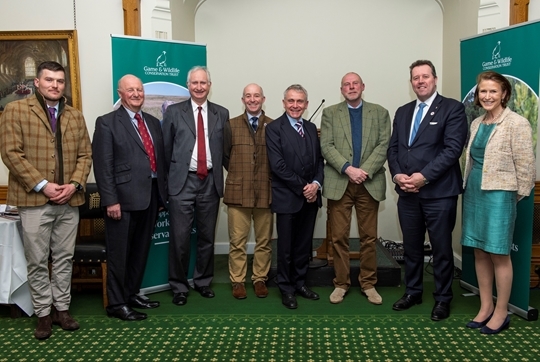
Environment minister Mark Spencer MP, Shadow DEFRA Minister Daniel Zeichner MP, and Baroness Bakewell, Lib Dem Environment spokesperson, were among MPs and policy makers who met moorland managers at the Palace of Westminster recently (23 March 2023) for the launch of Real Wilders, the GWCT’s new collection of case studies on the Working Conservationists preserving the UK’s precious uplands and their wildlife.
- You can download Real Wilders here or buy a copy here.
Sir Robert Goodwill MP EFRA select committee chair, who hosted the event in the Churchill Room in the Palace of Westminster said,
“This excellent report reveals the story of post-war conservation in the uplands as a cautionary tale that politicians would do well to heed. Too often focussed on a limited set of outcomes, one big idea has replaced another from intensive agriculture to commercial plantations and now rewilding, potentially destroying vast swathes of heather moorland and the wildlife that depends on it. And yet throughout this period grouse moor managers have protected our threatened peatlands and its special biodiversity. But that management is under increasing pressure and science and history show that what has been achieved over decades could be lost in a few short years. Future generations will not thank us if we make the wrong calls now.”
He continued: “We now have binding targets on delivering for wildlife and climate. Only 8% of UK land is classified as managed for nature, so it’s the 72% of UK land that is managed by farmers and gamekeepers which is going to be key to success. That’s why it’s vital that these successful Working Conservationists are given a voice and input into policy and why I’m delighted that they have made the long journey to Westminster to share their expertise with MPs face to face. It just shows how passionate they are about the places and wildlife they look after.”

GWCT CEO Teresa Dent, who spoke at the event, highlighted the scientific evidence that grouse management scores well against alternative land uses in delivering on nature recovery and climate change. She said:
“Demands on our uplands to produce public goods are greater than ever before and GWCT research has shown that grouse managers are able to deliver multiple benefits funded by private investment including biodiversity recovery, carbon storage, flood management, food production, wildfire mitigation and recreation.”
Working Conservationists featured in the case studies travelled from Scotland, the North of England and Wales to attend the event and put their viewpoint to politicians. Among them was Richard Bailey Peak District Regional Moorland Group spokesman. He said:
“In spite of dramatic national declines, official counts show grouse moors in the Peak District are doing really well for their red listed birds including lapwing, short-eared owl, merlin and globally threatened curlew. But we are seeing more red tape being loaded on to what is an already highly regulated area. If our practices are too restricted, the knock-on effect will be losing an iconic species like the curlew. We need to be able to use our expertise to get on with the job of protecting rare wildlife, restoring peatland and fighting the increasing threat of wildfire.”
Simon Lester former headkeeper on the Langholm Moor Demonstration Project, which reinstated grouse management to achieve a recovery of a suite of species including hen harriers, grouse and waders in just six years said:
“It is important that the people with the responsibility to make sweeping changes to how the uplands are managed engage with the pragmatic people who maintain these vulnerable areas. Many of these sites have designations due to historical management. Who should be accountable for success or failure of these protected areas, the landowner or the government agencies? Success is achieved by the right people doing the right thing at the right time. Good intentions alone will not halt or restore our precious wildlife.”
Real Wilders features five case studies from around the UK, as well as expert testimony from ornithologists, ecologists, conservationists, and GWCT science. It is available to buy from the GWCT for £4.99.
Order Real Wilders >
Notes to editors
The Game & Wildlife Conservation Trust – providing research-led conservation for a thriving countryside. The GWCT is an independent wildlife conservation charity which has carried out scientific research into Britain’s game and wildlife since the 1930s. We advise farmers and landowners on improving wildlife habitats. We employ 22 post-doctoral scientists and 50 other research staff with expertise in areas such as birds, insects, mammals, farming, fish and statistics. We undertake our own research as well as projects funded by contract and grant-aid from Government and private bodies. The Trust is also responsible for a number of Government Biodiversity Action Plan species and is lead partner for grey partridge and joint lead partner for brown hare and black grouse.
For information, contact:
Eleanor Williams
Telephone: 07592 025476
Email: press@gwct.org.uk